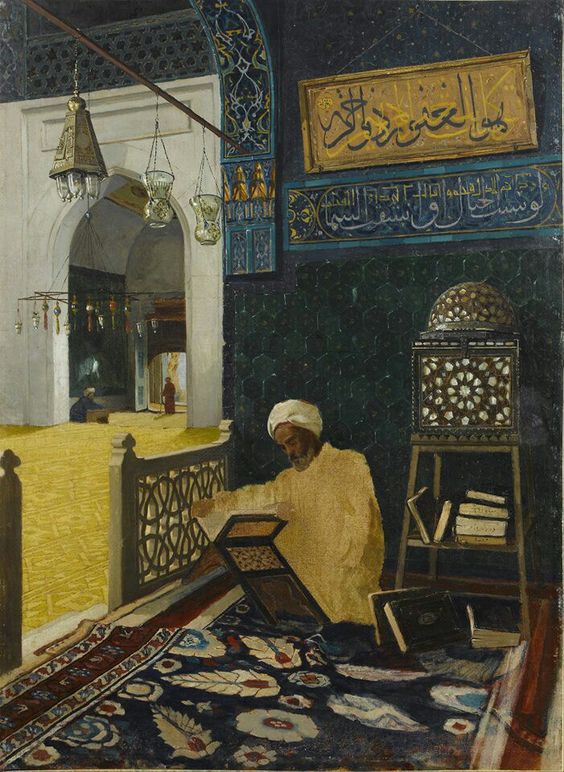
I stumbled across one of Sheikh Nuh’s old pamphlets that someone had given me years ago. Early in its pages, he lays out the profound difference between Academic Islamic studies and Traditional Islamic studies. He states:
University degrees… indicate a certain earnestness and effort of those who possess them but it cannot take the place… of having an unbroken line of teachers extending back to the prophet, peace to him.
These two pathways —academic and traditional, are not necessarily mutually exclusive. One could, for instance, study at the Al Azhar University obtaining an education from teachers with isnad back to the prophet, peace to him, while also receiving a Bachelor’s, Master’s or Ph.D. level degree. But often when people are comparing the two they are comparing a Western academic degree with an Islamic program or independent studies facilitated by teachers with a connection back to the prophet, peace to him. Before exploring either option in-depth it’s important to reflect on your educational, spiritual, and career goals.
The academic pathway
If your educational goal is to learn about Islam from a secular perspective then clearly academia is your pathway. Though you should understand that you will not be learning about Islam “objectively,” you’ll likely be learning from someone who is a non-Muslim, very possibly atheist or atheist leaning, or maybe even an irreligious Muslim. As well as studying texts in a way that is likely antagonistic to Islam. The only benefit I can see in a Muslim going this route is that they will then have the educational qualification to work in academia as an authority on Islam. If one can keep the faith or better yet if one is solidifying their faith by also pursuing a traditional Islamic education this pathway could be of extreme importance. By positioning yourself as a secular Islamic authority while having traditional Islamic knowledge you’d be able to right the wrongs of academia and provide secular students with, at the very least, a more balanced Islamic education.
Yet many Muslims are not so fortunate. They do not understand that all “Islamic studies” programs are not created equal and they take everything they learn in academia at face value. Worst yet, they see themselves as equal to (and sometimes better than) traditional Islamic teachers. They approach Islam with the worldview handed to them by their academic professors —skepticism, and they seek to reframe Islam into the isms of the day.
The religious pathway
If your goal is more religiously minded, the traditional route is the obvious option. Not only for the knowledge itself but for the suhbah provided therein. In my short stay in Jordan, I believe I benefitted more from the state of the students and shuyukh in the community than from the knowledge taught. Kindness, gratitude, love of the prophet, beneficial advice, and several other aspects that I probably can’t put into words still stay with me. I recall the advice given to me from time to time by one shaykha in particular but what also stays with me was her presence, her love of God, and her sincerity. This is not to say there aren’t any kind-hearted teachers in academia, but the traditional path is the combination of Islamic knowledge through a teacher who has a connection with the prophet, peace to him, in both knowledge and state. The traditional path is for those who want to study Islam to perfect their practice and improve their state with Allah.
The poor student of knowledge
The downside of dedicating a long duration to traditional knowledge is that you will not acquire a “hirable skillset”. There are only but so many Islamic institutes in the West, only a few Islamic public speakers make enough money to make a living, and being an Imam can often mean signing up for a life of near poverty (and that job is exclusive to men). This is fine for those who it’s fine for but most will find they cannot make a good living from any of those options and must acquire another skillset altogether. Thus some shuyukh teach for the love of Islam and do something else for money and of course there are others who live off the charity of their students/communities.
I met a woman recently who studied traditional knowledge for 6 or so years of her life but works a full-time job in a completely unrelated field. Of course, there is nothing inherently wrong with that, but it is a loss for our community that someone with so much to offer cannot economically afford to teach full time (assuming they’d want to if it was a possibility).
Traditional first, academic second
This is also why some shuyukh go the academic route after their traditional studies. A secular degree is a better means of finding work than a traditional Islamic studies track. Of course, married women, in particular, do have the option of not working to make a living thus sufficing on the mediocre financial gains (if any) of teaching in the Muslim community.
There’s a lot to be said on this issue and as I have discussed it before I’m sure I’ll visit it many times again. If you’re contemplating an academic degree or a traditional path in Islamic studies I think it’s important to ask yourself what your goal is, what you want to be doing when you finish your studies, what your current level of Islamic knowledge is, and probably several other relevant questions. But most important of all, you need to clearly understand that while they both bear the name ‘Islamic studies’ these two pathways —traditional and academic, bear little similarity.
_____________
Consider picking up a copy of my book, 40 Hadith of ‘Aisha, An English collection of 40 Hadith narrated by the beloved wife, scholar, and sage ‘Aisha bint Abu Bakr, available here. Also, consider signing up for our monthly newsletter here: bythefigandtheolive.com/newsletter. For speaking engagements visit Nuriddeenknight.com





Recent Comments